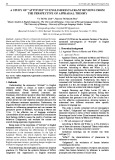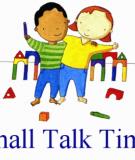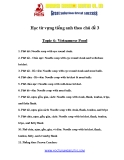
TNU Journal of Science and Technology
229(03): 75 - 81
http://jst.tnu.edu.vn 75 Email: jst@tnu.edu.vn
TEACHERS AND STUDENTS’ PERCEPTIONS OF USING ROLE PLAY
TO IMPROVE THE SECOND-YEAR STUDENTS’ SPEAKING SKILLS
IN ENGLISH FOR RESTAURANT AND HOTEL OPERATION COURSE
Hoang Thi Thuy An1, Hoang Huong Ly2*
1College of Trade and Tourism
2TNU - University of Technology
ARTICLE INFO
ABSTRACT
Received:
04/10/2023
This study explores both teachers and students’ perceptions of the use of role
play to enhance students' speaking skills in English for Restaurant and Hotel
Operation Course at a college in the north of Vietnam. The research addresses
three main questions including students' perceptions of role play impacting on
their speaking skills development, teachers' perceptions of employing role
play to enhance students' speaking abilities and recommendations derived
from study findings for optimizing role play as a teaching strategy. The
questionnaire, interview, and observation were employed as parts of both
qualitative and quantitative approaches. The findings highlight the value of
role play in improving speaking skills in hospitality-oriented language
courses. The students found role play tasks beneficial even though there were
challenges related to confidence, language proficiency and time constraints.
The study offers insights for improving role play instructions, addressing
difficulties, refining instruction techniques and integrating industry-specific
knowledge for immersive learning experiences. Moreover, the results and
recommendations benefit the students, the teachers, and the course.
Revised:
10/11/2023
Published:
10/11/2023
KEYWORDS
Role play
Perception
Speaking skills
Improvement
English for Restaurant and
Hotel Operation
QUAN ĐIỂM CỦA GIÁO VIÊN VÀ SINH VIÊN VỀ VIỆC SỬ DỤNG KĨ THUẬT
ĐÓNG VAI ĐỂ CẢI THIỆN KĨ NĂNG NÓI CỦA SINH VIÊN NĂM THỨ HAI
TRONG KHÓA HỌC TIẾNG ANH CHUYÊN NGÀNH
NGHIỆP VỤ NHÀ HÀNG VÀ KHÁCH SẠN
Hoàng Thị Thúy An1, Hoàng Hương Ly2*
1Trường Cao đẳng Thương mại và Du lịch
2Trường Đại học Kỹ thuật Công nghiệp – ĐH Thái Nguyên
THÔNG TIN BÀI BÁO
TÓM TẮT
Ngày nhận bài:
04/10/2023
Nghiên cứu này tìm hiểu quan điểm của giáo viên và sinh viên đối với việc sử
dụng hoạt động đóng vai để cải thiện kỹ năng nói của sinh viên trong khóa
học Tiếng Anh chuyên nghành Nghiệp vụ Nhà hàng và Khách sạn. Nghiên
cứu đề cập đến ba vấn đề chính bao gồm sinh viên nhận thức thế nào về tác
động của kĩ thuật đóng vai đối với phát triển kỹ năng nói, giáo viên nhận thức
như thế nào về việc sử dụng kĩ thuật đóng vai để nâng cao khả năng nói của
sinh viên và các khuyến nghị để tối ưu hóa kĩ thuật đóng vai như một phương
pháp giảng dạy. Bảng câu hỏi, phỏng vấn và quan sát được sử dụng như một
phần của cả phương pháp định tính và định lượng. Kết quả nghiên cứu nhấn
mạnh giá trị của hoạt động đóng vai trong việc cải thiện kỹ năng nói trong
khóa học Tiếng Anh chuyên ngành Nghiệp vụ Nhà hàng và Khách sạn. Sinh
viên nhận thấy kĩ thuật đóng vai mang lại lợi ích, mặc dù còn có những thách
thức liên quan đến sự tự tin, trình độ ngôn ngữ và hạn chế về thời gian.
Nghiên cứu cung cấp những hiểu biết sâu sắc để cải thiện các hướng dẫn cho
hoạt động đóng vai, giải quyết những khó khăn, điều chỉnh kỹ thuật giảng dạy
và tích hợp kiến thức chuyên ngành để tạo ra trải nghiệm học tập sâu rộng
hơn. Kết quả và khuyến nghị từ nghiên cứu mang lại lợi ích cho sinh viên,
giáo viên và khóa học Tiếng Anh Nghiệp vụ Nhà hàng và Khách sạn.
Ngày hoàn thiện:
10/11/2023
Ngày đăng:
10/11/2023
TỪ KHÓA
Kĩ thuật đóng vai
Quan điểm
Kĩ năng nói
Sự cải thiện
Tiếng Anh chuyên ngành Nhà
hàng và Khách sạn
DOI: https://doi.org/10.34238/tnu-jst.8894
* Corresponding author. Email: hoanghuongly@tnut.edu.vn

TNU Journal of Science and Technology
229(03): 75 - 81
http://jst.tnu.edu.vn 76 Email: jst@tnu.edu.vn
1. Introduction
According to Tran Minh Thanh et al. [1], it is widely accepted that fluency in the English
language is a key to success in life. Obviously, learners always desire to speak natural and fluent
English; however, the second-year students at College of Trade and Tourism faced difficulties in
speaking English fluently and naturally while they learned the course of English for Restaurant
and Hotel Operation. This could be attributed to factors like motivation, confidence, interests,
materials, and so on. To address this, various teaching techniques were employed, and role play
emerged as a particularly effective one. Role play provided opportunities for students to practice
in different social contexts and roles, leading to improved speaking skills. However, it is crucial
to consider individual students' comprehension levels and preferences, as different teaching
strategies may be more or less effective for each student. Therefore, the teachers’ and students'
perceptions of the use of role play should be assessed to determine its effects on student’s
speaking skills.
Speaking skills involve crafting and delivering a message for an audience. Carnegie [2] focuses
on tailoring messages to resonate with the audience. While Lucas [3] emphasizes intent, including
informing, entertaining, persuading, or inspiring, McCroskey [4] and Rapoport [5] highlight the
importance of both verbal and nonverbal cues in communication. McCarthy and Carter [6] stress
considering the listener's reactions, emphasizing the interactive nature of speaking.
Role play is considered a technique in teaching English which allows students to practice
speaking in a conversational situation, build confidence and fluency, assess progress and put
learning into action. It involves fantasy or imaginary situations in order to improve students’
speaking skills as well as creates motivation and involvement necessary for learning. Tompkins
[7] refers to its active engagement in learning English. Gower et al. [8] describe it as unscripted
role assumption in conversations. Keneth [9] sees it as intentional enactment for student
identification. Glover [10] highlights role play as a method for experiential learning and
perspective-taking in real-world scenarios.
Perception is the process by which we interpret and make sense of sensory information from our
environment. It involves organizing, interpreting, and giving meaning to the sensory input we
receive through our senses. This process is influenced by factors like previous experiences, cultural
background, emotions, and individual differences. Perception, as described by various scholars,
involves the process of extracting information [11]. Tubbs and Mors [12] mention its active nature,
where individuals selectively perceive, organize and interpret their experiences. Robbins [13]
similarly defines perception as the process through which individuals govern and interpret sensory
information to derive meaning in their environment. According to Kleinke [14], perception holds
significance in learning, as it influences how students engage with educational strategies.
Various studies have explored students' perceptions of using role play in learning speaking
skills. Abdel-Raheem [15] assessed the effectiveness of role-play in developing EFL students'
speaking skills. The results indicated a significant improvement in speaking abilities, with
positive feedback from both teachers and students. Melinda Dooly [16] explored role play as a
teaching technique for improving speaking skills in second language learners. The findings
demonstrated its effectiveness, with high levels of engagement and motivation reported by the
teachers and students. Rahma [17] investigated EFL students' perceptions of role play in language
learning. The study revealed that the students believed role play to be an effective technique for
improving speaking skills and enjoyed the activity. Another research conducted by [18] delved
into the influence of role-play exercises on the speaking abilities of Korean students who were
learning English as a foreign language. The study aimed to uncover whether engaging in role-
play activities led to noticeable improvements in the participants' speaking performance. Samuel
Adu-Gyamfi and Akua Agyeiwaa Owusu-Ansah [19] conducted a study on the use of role play as
a teaching technique in higher education. The results indicated that the students found role play

TNU Journal of Science and Technology
229(03): 75 - 81
http://jst.tnu.edu.vn 77 Email: jst@tnu.edu.vn
effective in improving their speaking skills and enhancing their overall learning experience.
Wang [20] conducted a study to investigate the effectiveness of role play in improving Chinese
EFL learners' speaking proficiency. The results showed that the use of role play significantly
improved the learners' speaking ability, particularly in terms of fluency and accuracy. While all
these studies investigated the teachers and students’ perception of using role play to improve
speaking skills in general, this research was conducted in English for Restaurant and Hotel
Operation Course. The study sought answers to the following questions:
1. What are the students’ perceptions of the use of role play to improve their speaking skill in
English for Restaurant and Hotel Operation Course?
2. What are the teachers’ perceptions regarding the use of role play as a teaching method to
enhance students' speaking skills in English for Restaurant and Hotel Operation Course?
3. What recommendations can be made for using role play as a teaching method to enhance
students' speaking skills in English for Restaurant and Hotel Operation Course based on the
findings of the study?
2. Methodology
2.1. Research design
Descriptive qualitative method was applied in the research. The data collection instruments
used to collect the data were the questionnaire and interview which assisted to gather students
and teachers’ perceptions of using role play to improve students’ speaking skill.
2.2. Participants
This research was conducted in TB58NS2 and TB58QD1 classes at College of Trade and
Tourism with sixty second-year students. Each class has thirty students, who learned sixty
periods of English for Restaurant and Hotel Operation. In addition, three English teachers
teaching English for Restaurant and Hotel Operation Course participated in the interview.
2.3. Data collection instrument
The data was collected from the questionnaire and interview. There were three parts with
closed-ended questions, open-ended questions and Likert scale questions for students’
questionnaire section and ten questions for teachers’ interview section.
The researcher planned to explore the teachers' views on using role play to enhance speaking skills
in the English for Restaurant and Hotel Operation course; therefore, conducting semi-structured
interviews with these teachers was an appropriate method for gathering insights. This approach
allows for in-depth discussions on experiences, attitudes and challenges related to role play.
2.4. Data analysis
The questionnaire was analyzed by descriptive statistics such as means, frequencies and
percentages. This provided an understanding of the students' perceptions of using role play to
improve their speaking skills.
An interval scoring system was employed to evaluate the students' responses on the
questionnaire. This system categorized responses into distinct intervals, ranging from "Strongly
Disagree" for scores between 0 and 2, “Disagree” for scores between 2.1 and 2.5, “Undecided”
for scores between 2.6 and 3, “Agree” for scores between 3.1 and 3.5 to "Strongly Agree" for
scores between 3.6 and 4 [21, p. 137]. After data collection, the scoring system was applied to
analyze the participants' feedback.
To determine the average response, the mean score (x) was calculated using the formula x =
∑x/N, where x was represented as the mean, ∑x denoted the total raw score, and N was signified
as the total number of participating students [22, p. 298]. Additionally, a grand mean score (X)

TNU Journal of Science and Technology
229(03): 75 - 81
http://jst.tnu.edu.vn 78 Email: jst@tnu.edu.vn
was computed by summing all individual mean scores and dividing by the total number of
questionnaires.
3. Results and discussion
3.1. Findings from the students’ questionnaires
The closed-ended questionnaire consisted of four questions (Appendix 1), and the results of
questionnaire were shown in table 1.
Table 1. Students’ engagement and preferences in Restaurant and Hotel Operation Course
Option (%)
Content of questions
A
B
C
D
E
1. Have you ever participated in role play activities in your Restaurant
and Hotel Operation Course before?
66.7
25
8.3
2. What would you like to achieve by the end of this course?
100
41.7
86.7
66.7
3. What types of feedback do you find helpful after participating in a
role play activity?
46.7
90
83.3
58.3
4. Would you like to see more role play activities incorporated into your
Restaurant and Hotel Operation Course?
96.7
3.3
Table 1 summarizes the students' past experiences with role play activities, their goals for the
course, the types of feedback they find helpful and their preferences for incorporating more role
play activities into the curriculum. This information can be used to understand student
engagement levels and preferences, which can be valuable for optimizing the course content and
teaching methods to better suit the needs and expectations of the students.
Table 2 illustrates the result of the questionnaire which investigated students’ perception of
using role play in Restaurant and Hotel Operation Course.
Table 2. Students’ perception of using role play in Restaurant and Hotel Operation Course
(Unit: %)
No.
Question
Strongly
agree
Agree
Undecided
Disagree
Strongly
disagree
1
Role play activities are important for students who
are studying Restaurant and Hotel Operation.
25
41.7
33.3
0
0
2
Role play activities are suitable for students to
practise speaking.
50
33.3
16.7
0
0
3
Role play activities help students to understand the
hospitality industry better.
25
33.3
36.7
5
0
4
Role play activities can improve students’
vocabulary and grammar structure.
41.7
33.3
25
0
0
5
Role play activities can help students improve their
fluency and build their confidence in speaking.
33.3
35
25
6.7
0
6
Role play activities can help students improve their
communication skills.
33.3
35
25
6.7
0
7
Role play activities help students develop their
collaborative skills.
28.3
41.7
25
5
0
8
Students feel comfortable when participating in role
play activities.
25
33.3
30
11.7
0
9
Role play is an interesting way to learn English for
Restaurant and Hotel Operation Course.
33.3
41.7
25
0
0
10
Role play activities should be used in all speaking
lessons.
30
28.3
30
11.7
0
As can be seen from table 2, the majority of students (over 50%) agree or strongly agree that
role play activities in the Restaurant and Hotel Operation Course are important (66.7%) and
suitable for practicing speaking (83.3%). They also contribute to understand the hospitality

TNU Journal of Science and Technology
229(03): 75 - 81
http://jst.tnu.edu.vn 79 Email: jst@tnu.edu.vn
industry (58.3%). Besides, they improve vocabulary and grammar (75%) and so on. It can be
concluded that the students have positive attitudes towards using role play to improve their
speaking skills in Restaurant and Hotel Operation Course.
By collecting information from open-ended questions, the researcher understands the
challenges that the students have experienced when participating in role play activities.
Table 3. Students’ difficulties when participating in role play activities
Options
Number of students
Percentage (%)
Do not feel confident to act out
50
83.3
Limited vocabulary and grammar structures
40
66.7
Related to hotel and restaurant topics
Lack of time to prepare the role
30
50
Lack of classroom space
30
50
Poor interaction among individuals
20
33.3
Table 3 indicates that learners face various difficulties during role play activities. One of the
biggest factors that students met was their low self-confidence (50 students or 83.3%). There
may be underlying factors contributing to their self-doubt or fear of performing in front of
others. A significant number of students (40 students or 66.7%) feel they lack the necessary
language skills to effectively engage in role play activities. It suggests that there may be a need
for more focused language instruction and vocabulary-building exercises to help students
improve their language proficiency. Surprisingly, half of the students thought that there is a
lack of time and classroom space to prepare the role. These challenges highlight the importance
of allocating sufficient time and space within the classroom for students to prepare for role play
activities. The last challenge provided by 20 students or 33.3% indicating poor interaction
among individuals during role play activities suggests that there may be difficulties in
effectively engaging and communicating with their peers.
It is important to remember that addressing these challenges requires a tailored approach
based on the specific needs and abilities of the students. Regular assessment and feedback can
help identify individual areas for improvement and allow for targeted support to overcome these
challenges effectively.
Based on the open-ended questions, the researcher also understands the students’ suggestions
or feedback for how role play activities could be improved.
Figure 1. Students’ suggestions to improve role play activities
Figure 1 presents the students’ suggestions to improve role play activities. Since 50% of the
students mentioned the need for clear instructions, it suggests that there may have been some
confusion or ambiguity in the role play activities. The fact that 20% of the students mentioned the
need for detailed feedback indicates that they value specific guidance on their performance. The
remaining 10% of the students provided miscellaneous suggestions, including variation in
scenarios, encouraging creativity, time management, peer collaboration, incorporation of
50%
20%
20%
10%
clear instructions
detailed feedback
practice senarios
others








![Từ vựng tiếng Anh về phòng ăn [A-Z] đầy đủ nhất](https://cdn.tailieu.vn/images/document/thumbnail/2013/20130620/oishithetgiay/135x160/7621371694068.jpg)





![Từ vựng tiếng Anh về thức ăn và giảm cân [mới nhất, đầy đủ]](https://cdn.tailieu.vn/images/document/thumbnail/2025/20251217/nglinh.diamond@gmail.com/135x160/53091766028543.jpg)


![Tài liệu Từ vựng tiếng Anh Trung cấp [mới nhất]](https://cdn.tailieu.vn/images/document/thumbnail/2025/20250913/nguyentuan250421@gmail.com/135x160/99491757910839.jpg)
![Tài liệu Từ vựng Tiếng Anh theo chủ đề [mới nhất]](https://cdn.tailieu.vn/images/document/thumbnail/2025/20250913/namdhuet@gmail.com/135x160/83251757753810.jpg)



![Tài liệu Từ vựng tiếng Anh cho bé [chuẩn nhất/mới nhất]](https://cdn.tailieu.vn/images/document/thumbnail/2025/20250731/huadaithesang2509@gmail.com/135x160/18631754013896.jpg)



